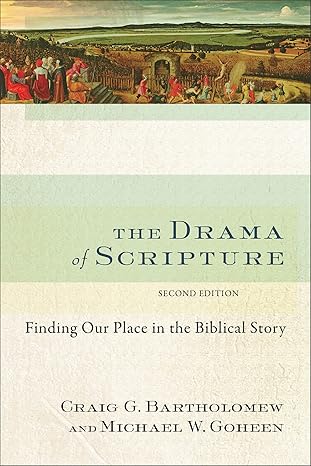Reviewed by Miguel Echevarria
Introduction
Craig G. Bartholomew is the H. Evan Runner Professor of Philosophy at Redeemer University College and principal of The Paideia Centre for Public Theology. Michael W. Goheen is Director of Theological Education and Scholar-in-Residence at the Missional Training Center – Phoenix. He is also Jake and Betsy Tuls Professor of Missiology at Calvin Theological Seminary. Their first volume on The Drama of Scripture was well received, being used by a number of colleges, seminaries, and churches, and translated into various languages. This review will provide a brief summary and analysis of Bartholomew and Goheen’s second edition of Drama, which they divide into five acts.
Summary
In Act 1, God creates the world to be his kingdom and people to be his vice-regents (Gen 1-2). Adam and Eve’s “royal stewardship of Eden is to be a small version of what God intends to happen to the whole creation as history unfolds” (37). In Act 2, Adam and Eve rebel against the divine king (Gen 3). God nonetheless promises to redeem them, signaling that he has not given up on his people (Gen 3:15).
In Act 3, God elects Israel to be his agents of redemption. To them he gives the promise of a land where they would be a kingdom of priests, mediating God’s glory to the world (Gen–Deut). Israel fails at this mission, for they abandon God’s law. God then appoints under-kings “of the great king, the Lord” (93) – the most faithful of whom is David. From David will come a king who would bring peace to Israel and rest from their enemies (2 Sam 7). Because David’s son, Solomon, falls into idolatry, God splits the kingdom – Israel in the north and Judah in the south. This begins the painful journey that would result in exile (2 Kings). Yet “God has not forgotten his promise. God will renew Israel and then draw all nations to himself. In that process the whole creation will be renewed. God’s kingdom will be established over the whole earth” (117). The Old Testament concludes with this expectation.
The Interlude to Drama affirms that Israel holds to this hope throughout the inter-testamental period. Despite living under foreign oppression, they wait for their God to establish his kingdom and crush their enemies. Jesus is born into the context of such expectation.
In Act 4, the biblical story reaches its climax (the Gospels). Jesus’ resurrection initiates the renewal and restoration of the earth and the arrival of the kingdom. Act 5 clarifies that the kingdom has not fully arrived (Acts and epistles). “More peoples must first be gathered to the banquet table so that they too might taste of the renewing power of the coming age” (185). The present period is the “in-between time, after Jesus’s first coming and before he comes again … a time of mission for the exalted Christ, Spirit, and the church” (185). While living between the times, the church is called to spread the news of the kingdom to the entire world.
Act 6 presents a picture of the full redemption of creation and the final establishment of the kingdom. At that time, the old order will give way to the new creation over which Christ will reign (Rev 21:5). Those who follow Christ will rule with him. Those who oppose him will be crushed.
Analysis
Bartholomew and Goheen’s Drama is an excellent presentation of the Bible’s coherent story of God’s kingdom. Rightly do they see the theme of kingdom as central to the storyline. This book is especially helpful for those who view the Bible as a “mere jumble of history, poetry, lessons on morality and theology, comforting promises, guiding principles, and commands,” for every passage must be understood in light of the larger narrative.
The Drama of Scripture is very accessible to scholar, student, and lay person alike. Bartholomew and Goheen provide helpful web resources, such as PowerPoint slides and a thirteen-week reading schedule, which enhance the quality of the reader’s experience.
I would have liked to have seen a discussion of how books such as Job, the Psalms, Proverbs, and Ecclesiastes contribute to the Bible’s storyline. Does the plot pause in such books? Do these books give you an overview of the narrative?
Overall, Drama is an excellent book on the storyline of Scripture. I intend to use it in my own college level Bible courses. I hope it receives a wide audience beyond my classroom.
Miguel Echevarria, Ph.D., is Assistant Professor of Christian Ministries at the University of Mobile.
